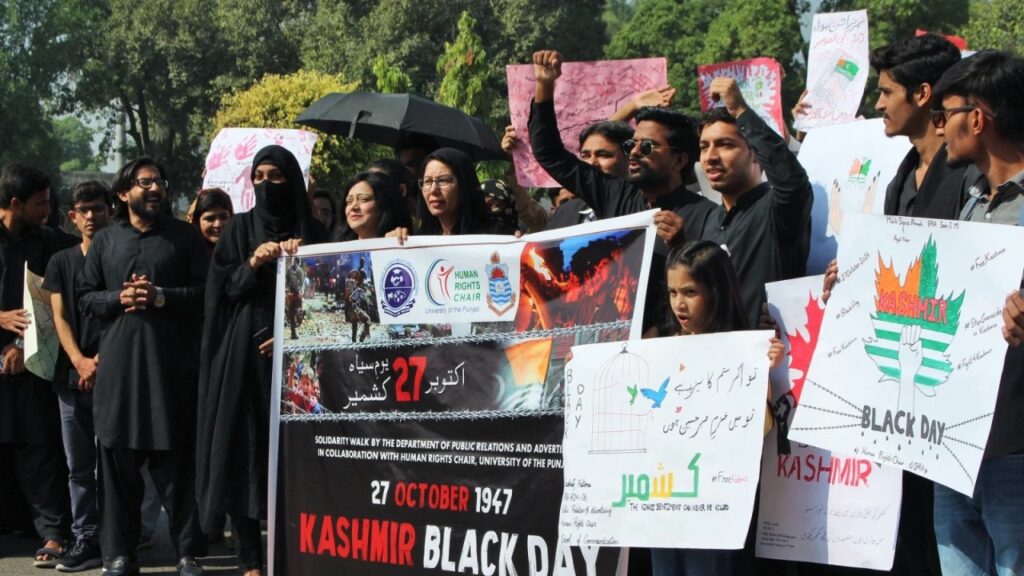
By Iqbal Jassat
Annually since 1947, 27 October is commemorated as one of the darkest days for the people of Kashmir. It was following the long freedom struggle from British colonial rule, which resulted in the independence of India and Pakistan, that Indian troops positioned themselves in Kashmir’s largest city, Srinagar, to occupy the Valley.
Hence, the anniversary of India’s action is observed by Kashmiris and opponents of its long-drawn occupation as “Black Day”.
Almost eight decades later, as in the case of Palestine’s unlawful occupation and brutal genocide, the oppressed and brutalized people of Kashmir are looking towards the international community for justice.
It has been a long and painful wait, given the horrendous levels of punishment faced by Kashmiris seeking freedom and justice.
The failure of the international community to fulfil its obligations flows from multiple UN Security Council resolutions, foremost being a free and impartial plebiscite for Kashmiris to exercise their inalienable right to self-determination, is a disgrace.
The silence and inaction of global institutions is a matter of grave concern. Just as it has allowed Netanyahu to massacre Palestinians without accountability, so too has Modi behaved with impunity in Kashmir.
Survival under Indian occupation reveals a litany of war crimes perpetrated by successive Indian governments, especially the right-wing Bharatiya Janata Party (BJP) led regime of Narendra Modi.
The BJP has been correctly described by many commentators as a Hindu fascist party that openly espouses admiration for Nazism and Zionism. As a close ally of Israel’s colonial entity, India has much to its shame, seen love blossoming between Modi and Benjamin Netanyahu.
Military and economic ties between the two regimes involved simultaneously in the occupation of Palestine and Kashmir spell out the ugly reality of Hindutva and Zionism, being two sides of the same coin.
Of course, many more parallels exist. In October 2017, the Indian army launched what is referred to as “Operation All Out.” Under this policy, Indian occupation troops were given carte blanche to shoot and kill any Kashmiri youth suspected of being a “militant” or even a “militant sympathizer.”
This shoot-to-kill order has augmented the already oppressive law, the Armed Forces Special Powers Act, under which Indian colonial troops are exempt from prosecution if they kill innocent Kashmiris.
India is touted as the world’s largest democracy, yet its military occupation of Kashmir and the enactment of special legislation to suppress all rights in the Valley make a mockery of this claim.
“The unending repression, human rights’ abuses and organized Indian state terrorism that started from an illegal invasion at Srinagar on October 27, 1947 were further intensified after the fascist Modi Govt had unlawfully revoked the special status of the Indian Illegally Occupied Jammu and Kashmir (IIOJK) on August 5, 2019” said Adnan Sarwar Khan, former Chairman, International Relations Department at University of Peshawar while talking to APP on Thursday.
The special status he refers to is the abrogation of Articles 370 and 35 A on August 5, 2019.
The result is that the crime of occupation is compounded by the fact that India has rendered millions of Kashmiris without any human rights.
The question we expect the South African government, as well as civil society, to pose is for how long will the Modi regime be allowed to hold Kashmiris hostage at gunpoint?
It is crucial to recall that on that fateful day in 1947, the Indian government sent its troops to Jammu and Kashmir against the will of the Kashmiri people.
Seventy-seven years later, the horror of terrorism linked to Modi’s military occupation continues mercilessly – against the will of Kashmir’s population.
Kashmir and Palestine are both engaged in a prolonged freedom struggle, enduring decades of turmoil, oppression, human rights violations and genocide.
*Iqbal Jassat is an Executive Member of the MEDIA REVIEW NETWORK.


